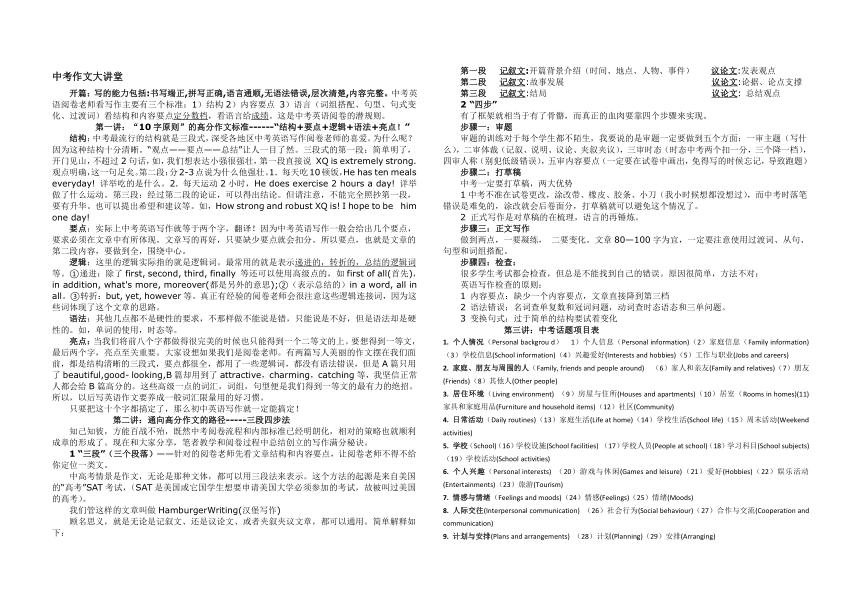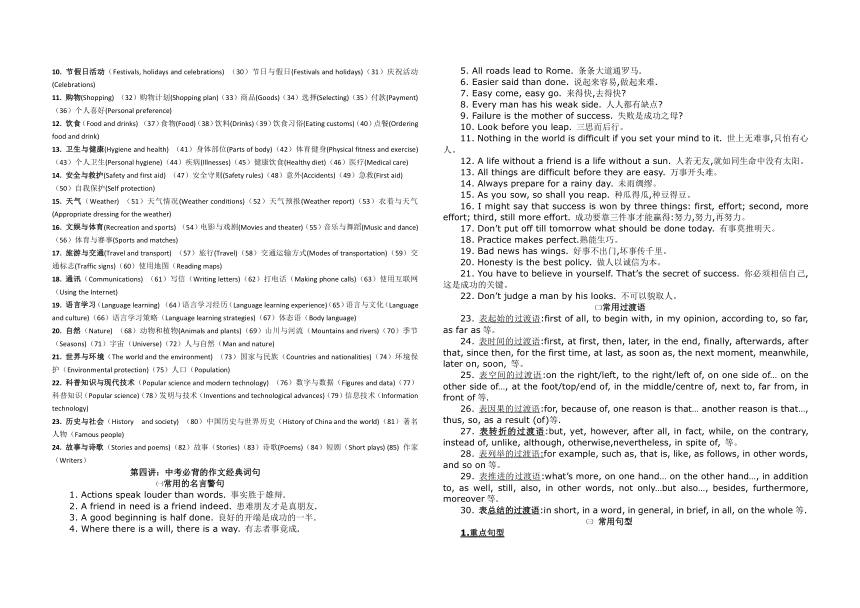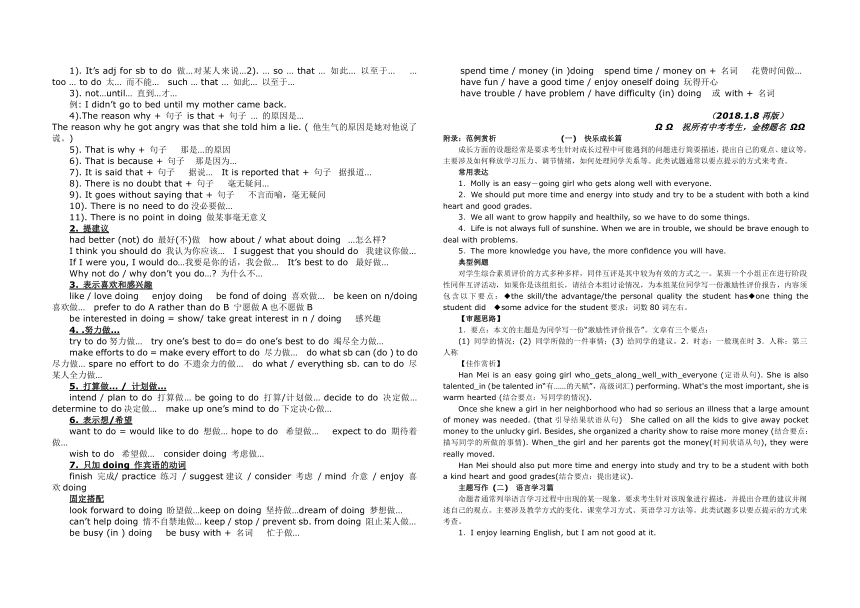中考英语二轮专题复习学案-作文指导
图片预览



文档简介
中考作文大讲堂
开篇:写的能力包括:书写端正,拼写正确,语言通顺,无语法错误,层次清楚,内容完整。中考英语阅卷老师看写作主要有三个标准:1)结构2)内容要点 3)语言(词组搭配、句型、句式变化、过渡词)看结构和内容要点定分数档,看语言给成绩。这是中考英语阅卷的潜规则。
第一讲:“10字原则”的高分作文标准------“结构+要点+逻辑+语法+亮点!”
结构:中考最流行的结构就是三段式,深受各地区中考英语写作阅卷老师的喜爱。为什么呢?因为这种结构十分清晰。“观点——要点——总结”让人一目了然。三段式的第一段:简单明了,开门见山,不超过2句话,如,我们想表达小强很强壮,第一段直接说 XQ is extremely strong. 观点明确,这一句足矣。第二段:分2-3点说为什么他强壮。1. 每天吃10顿饭,He has ten meals everyday! 详举吃的是什么。2. 每天运动2小时,He does exercise 2 hours a day! 详举做了什么运动。第三段:经过第二段的论证,可以得出结论。但请注意,不能完全照抄第一段,要有升华。也可以提出希望和建议等。如,How strong and robust XQ is! I hope to be? him one day!
要点:实际上中考英语写作就等于两个字,翻译!因为中考英语写作一般会给出几个要点,要求必须在文章中有所体现。文章写的再好,只要缺少要点就会扣分。所以要点,也就是文章的第二段内容,要做到全,围绕中心。
逻辑:这里的逻辑实际指的就是逻辑词。最常用的就是表示递进的,转折的,总结的逻辑词等。①递进:除了first, second, third, finally 等还可以使用高级点的,如first of all(首先),in addition, what's more, moreover(都是另外的意思);②(表示总结的)in a word, all in all。③转折:but, yet, however等。真正有经验的阅卷老师会很注意这些逻辑连接词,因为这些词体现了这个文章的思路。
语法:其他几点都不是硬性的要求,不那样做不能说是错,只能说是不好,但是语法却是硬性的。如,单词的使用,时态等。
亮点:当我们将前八个字都做得很完美的时候也只能得到一个二等文的上。要想得到一等文,最后两个字,亮点至关重要。大家设想如果我们是阅卷老师。有两篇写人美丽的作文摆在我们面前,都是结构清晰的三段式,要点都很全,都用了一些逻辑词,都没有语法错误,但是A篇只用了beautiful,good- looking,B篇却用到了attractive,charming,catching等,我坚信正常人都会给B篇高分的。这些高级一点的词汇,词组,句型便是我们得到一等文的最有力的绝招。所以,以后写英语作文要养成一般词汇限量用的好习惯。
只要把这十个字都搞定了,那么初中英语写作就一定能搞定!
第二讲:通向高分作文的路径-----三段四步法
知己知彼,方能百战不殆,既然中考阅卷流程和内部标准已经明朗化,相对的策略也就顺利成章的形成了。现在和大家分享,笔者教学和阅卷过程中总结创立的写作满分秘诀。
1 “三段”(三个段落)——针对的阅卷老师先看文章结构和内容要点,让阅卷老师不得不给你定位一类文。
中高考情景是作文,无论是那种文体,都可以用三段法来表示。这个方法的起源是来自美国的“高考”SAT考试,(SAT是美国或它国学生想要申请美国大学必须参加的考试,故被叫过美国的高考)。
我们管这样的文章叫做HamburgerWriting(汉堡写作)
顾名思义,就是无论是记叙文、还是议论文、或者夹叙夹议文章,都可以通用。简单解释如下:
第一段 记叙文:开篇背景介绍(时间、地点、人物、事件) 议论文:发表观点
第二段 记叙文:故事发展 议论文:论据、论点支撑
第三段 记叙文:结局 议论文: 总结观点
2 “四步”
有了框架就相当于有了骨骼,而真正的血肉要靠四个步骤来实现。
步骤一:审题
审题的训练对于每个学生都不陌生,我要说的是审题一定要做到五个方面:一审主题(写什么),二审体裁(记叙、说明、议论、夹叙夹议),三审时态(时态中考两个扣一分,三个降一档),四审人称(别犯低级错误),五审内容要点(一定要在试卷中画出,免得写的时候忘记,导致跑题)
步骤二:打草稿
中考一定要打草稿,两大优势
1中考不准在试卷更改,涂改带、橡皮、胶条、小刀(我小时候想都没想过),而中考时落笔错误是难免的,涂改就会后卷面分,打草稿就可以避免这个情况了。
2 正式写作是对草稿的在梳理,语言的再锤炼。
步骤三:正文写作
做到两点,一要凝练, 二要变化。文章80—100字为宜,一定要注意使用过渡词、从句、句型和词组搭配。
步骤四:检查:
很多学生考试都会检查,但总是不能找到自己的错误。原因很简单,方法不对:
英语写作检查的原则:
1 内容要点:缺少一个内容要点,文章直接降到第三档
2 语法错误:名词查单复数和冠词问题,动词查时态语态和三单问题。
3 变换句式:过于简单的结构要试着变化
第三讲:中考话题项目表
1. 个人情况(Personal backgrou d) 1)个人信息(Personal information)(2)家庭信息(Family information)(3)学校信息(School information)(4)兴趣爱好(Interests and hobbies)(5)工作与职业(Jobs and careers)
2. 家庭、朋友与周围的人(Family, friends and people around) (6)家人和亲友(Family and relatives)(7)朋友(Friends)(8)其他人(Other people)
3. 居住环境(Living environment) (9)房屋与住所(Houses and apartments)(10)居室(Rooms in homes)(11)家具和家庭用品(Furniture and household items)(12)社区(Community)
4. 日常活动(Daily routines)(13)家庭生活(Life at home)(14)学校生活(School life)(15)周末活动(Weekend activities)
5. 学校(School)(16)学校设施(School facilities) (17)学校人员(People at school)(18)学习科目(School subjects)(19)学校活动(School activities)
6. 个人兴趣(Personal interests) (20)游戏与休闲(Games and leisure)(21)爱好(Hobbies)(22)娱乐活动(Entertainments)(23)旅游(Tourism)
7. 情感与情绪(Feelings and moods)(24)情感(Feelings)(25)情绪(Moods)
8. 人际交往(Interpersonal communication) (26)社会行为(Social behaviour)(27)合作与交流(Cooperation and communication)
9. 计划与安排(Plans and arrangements) (28)计划(Planning)(29)安排(Arranging)
10. 节假日活动(Festivals, holidays and celebrations) (30)节日与假日(Festivals and holidays)(31)庆祝活动(Celebrations)
11. 购物(Shopping) (32)购物计划(Shopping plan)(33)商品(Goods)(34)选择(Selecting)(35)付款(Payment)(36)个人喜好(Personal preference)
12. 饮食(Food and drinks) (37)食物(Food)(38)饮料(Drinks)(39)饮食习俗(Eating customs)(40)点餐(Ordering food and drink)
13. 卫生与健康(Hygiene and health) (41)身体部位(Parts of body)(42)体育健身(Physical fitness and exercise)(43)个人卫生(Personal hygiene)(44)疾病(Illnesses)(45)健康饮食(Healthy diet)(46)医疗(Medical care)
14. 安全与救护(Safety and first aid) (47)安全守则(Safety rules)(48)意外(Accidents)(49)急救(First aid)
(50)自我保护(Self protection)
15. 天气(Weather) (51)天气情况(Weather conditions)(52)天气预报(Weather report)(53)衣着与天气(Appropriate dressing for the weather)
16. 文娱与体育(Recreation and sports) (54)电影与戏剧(Movies and theater)(55)音乐与舞蹈(Music and dance)(56)体育与赛事(Sports and matches)
17. 旅游与交通(Travel and transport) (57)旅行(Travel)(58)交通运输方式(Modes of transportation)(59)交通标志(Traffic signs)(60)使用地图(Reading maps)
18. 通讯(Communications) (61)写信(Writing letters)(62)打电话(Making phone calls)(63)使用互联网(Using the Internet)
19. 语言学习(Language learning) (64)语言学习经历(Language learning experience)(65)语言与文化(Language and culture)(66)语言学习策略(Language learning strategies)(67)体态语(Body language)
20. 自然(Nature) (68)动物和植物(Animals and plants)(69)山川与河流(Mountains and rivers)(70)季节(Seasons)(71)宇宙(Universe)(72)人与自然(Man and nature)
21. 世界与环境(The world and the environment) (73)国家与民族(Countries and nationalities)(74)环境保护(Environmental protection)(75)人口(Population)
22. 科普知识与现代技术(Popular science and modern technology) (76)数字与数据(Figures and data)(77)科普知识(Popular science)(78)发明与技术(Inventions and technological advances)(79)信息技术(Information technology)
23. 历史与社会(History and society) (80)中国历史与世界历史(History of China and the world)(81)著名人物(Famous people)
24. 故事与诗歌(Stories and poems)(82)故事(Stories)(83)诗歌(Poems)(84)短剧(Short plays) (85) 作家(Writers)
第四讲:中考必背的作文经典词句
㈠常用的名言警句
1. Actions speak louder than words. 事实胜于雄辩.
2. A friend in need is a friend indeed. 患难朋友才是真朋友.
3. A good beginning is half done. 良好的开端是成功的一半.
4. Where there is a will, there is a way. 有志者事竟成.
5. All roads lead to Rome. 条条大道通罗马.
6. Easier said than done. 说起来容易,做起来难.
7. Easy come, easy go. 来得快,去得快?
8. Every man has his weak side. 人人都有缺点?
9. Failure is the mother of success. 失败是成功之母?
10. Look before you leap. 三思而后行。
11. Nothing in the world is difficult if you set your mind to it. 世上无难事,只怕有心人。
12. A life without a friend is a life without a sun. 人若无友,就如同生命中没有太阳。
13. All things are difficult before they are easy. 万事开头难。
14. Always prepare for a rainy day. 未雨绸缪。
15. As you sow, so shall you reap. 种瓜得瓜,种豆得豆。
16. I might say that success is won by three things: first, effort; second, more effort; third, still more effort. 成功要靠三件事才能赢得:努力,努力,再努力。
17. Don’t put off till tomorrow what should be done today. 有事莫推明天。
18. Practice makes perfect.熟能生巧。
19. Bad news has wings. 好事不出门,坏事传千里。
20. Honesty is the best policy. 做人以诚信为本。
21. You have to believe in yourself. That’s the secret of success. 你必须相信自己,这是成功的关键。
22. Don’t judge a man by his looks. 不可以貌取人。
㈡常用过渡语
23. 表起始的过渡语:first of all, to begin with, in my opinion, according to, so far, as far as等。
24. 表时间的过渡语:first, at first, then, later, in the end, finally, afterwards, after that, since then, for the first time, at last, as soon as, the next moment, meanwhile, later on, soon, 等。
25. 表空间的过渡语:on the right/left, to the right/left of, on one side of… on the other side of…, at the foot/top/end of, in the middle/centre of, next to, far from, in front of等.
26. 表因果的过渡语:for, because of, one reason is that… another reason is that…, thus, so, as a result (of)等.
27. 表转折的过渡语:but, yet, however, after all, in fact, while, on the contrary, instead of, unlike, although, otherwise,nevertheless, in spite of, 等。
28. 表列举的过渡语:for example, such as, that is, like, as follows, in other words, and so on等。
29. 表推进的过渡语:what’s more, on one hand… on the other hand…, in addition to, as well, still, also, in other words, not only…but also…, besides, furthermore, moreover等.
30. 表总结的过渡语:in short, in a word, in general, in brief, in all, on the whole等.
㈢ 常用句型
1.重点句型
1). It’s adj for sb to do 做…对某人来说…2). … so … that … 如此… 以至于… … too … to do 太… 而不能… such … that … 如此… 以至于…
3). not…until… 直到…才…
例: I didn’t go to bed until my mother came back.
4).The reason why + 句子 is that + 句子 … 的原因是…
The reason why he got angry was that she told him a lie. ( 他生气的原因是她对他说了谎。)
5). That is why + 句子??? 那是…的原因
6). That is because + 句子?? 那是因为…
7). It is said that + 句子??? 据说… It is reported that + 句子? 据报道…
8). There is no doubt that + 句子??? 毫无疑问…
9). It goes without saying that + 句子??? 不言而喻,毫无疑问
10). There is no need to do没必要做…
11). There is no point in doing 做某事毫无意义
2. 提建议
had better (not) do 最好(不)做 how about / what about doing? …怎么样?
I think you should do 我认为你应该… I suggest that you should do? 我建议你做…
If I were you, I would do…我要是你的话,我会做… It’s best to do? 最好做…
Why not do / why don’t you do…? 为什么不…
3. 表示喜欢和感兴趣
like / love doing enjoy doing be fond of doing 喜欢做… be keen on n/doing 喜欢做… prefer to do A rather than do B 宁愿做A也不愿做B
be interested in doing = show/ take great interest in n / doing??? 感兴趣
4. .努力做…
try to do努力做… try one’s best to do= do one’s best to do 竭尽全力做…
make efforts to do = make every effort to do 尽力做… do what sb can (do ) to do 尽力做… spare no effort to do 不遗余力的做… do what / everything sb. can to do 尽某人全力做…
5. 打算做… / 计划做…
intend / plan to do 打算做… be going to do 打算/计划做… decide to do 决定做… determine to do决定做… make up one’s mind to do下定决心做…
6. 表示想/希望
want to do = would like to do 想做… hope to do? 希望做… expect to do 期待着做…
wish to do? 希望做… consider doing 考虑做…
7. 只加doing 作宾语的动词
finish 完成/ practice 练习 / suggest建议 / consider 考虑 / mind 介意 / enjoy 喜欢doing
固定搭配
look forward to doing 盼望做…keep on doing 坚持做…dream of doing 梦想做…
can’t help doing 情不自禁地做… keep / stop / prevent sb. from doing 阻止某人做…
be busy (in ) doing??? be busy with + 名词??? 忙于做…
spend time / money (in )doing?? spend time / money on + 名词??? 花费时间做…
have fun / have a good time / enjoy oneself doing 玩得开心
have trouble / have problem / have difficulty (in) doing?? 或 with + 名词??
(2018.1.8再版)
? ? 祝所有中考考生,金榜题名 ??
附录:范例赏析 (一) 快乐成长篇
成长方面的设题经常是要求考生针对成长过程中可能遇到的问题进行简要描述,提出自己的观点、建议等。主要涉及如何释放学习压力、调节情绪,如何处理同学关系等。此类试题通常以要点提示的方式来考查。
常用表达
1.Molly is an easy-going girl who gets along well with everyone.
2.We should put more time and energy into study and try to be a student with both a kind heart and good grades.
3.We all want to grow happily and healthily, so we have to do some things.
4.Life is not always full of sunshine. When we are in trouble, we should be brave enough to deal with problems.
5.The more knowledge you have, the more confidence you will have.
典型例题
对学生综合素质评价的方式多种多样,同伴互评是其中较为有效的方式之一。某班一个小组正在进行阶段性同伴互评活动,如果你是该组组长,请结合本组讨论情况,为本组某位同学写一份激励性评价报告,内容须包含以下要点:◆the skill/the advantage/the personal quality the student has◆one thing the student did ◆some advice for the student要求:词数80词左右。
【审题思路】
1.要点:本文的主题是为同学写一份“激励性评价报告”。文章有三个要点:
(1) 同学的情况;(2) 同学所做的一件事情;(3) 给同学的建议。2.时态:一般现在时3.人称:第三人称
【佳作赏析】
Han Mei is an easy going girl who_gets_along_well_with_everyone (定语从句). She is also talented_in (be talented in“有……的天赋”,高级词汇) performing. What's the most important, she is warm hearted (结合要点:写同学的情况).
Once she knew a girl in her neighborhood who had so serious an illness that a large amount of money was needed. (that引导结果状语从句) She called on all the kids to give away pocket money to the unlucky girl. Besides, she organized a charity show to raise more money (结合要点:描写同学的所做的事情). When_the girl and her parents got the money(时间状语从句), they were really moved.
Han Mei should also put more time and energy into study and try to be a student with both a kind heart and good grades(结合要点:提出建议).
主题写作 (二) 语言学习篇
命题者通常列举语言学习过程中出现的某一现象,要求考生针对该现象进行描述,并提出合理的建议并阐述自己的观点。主要涉及教学方式的变化、课堂学习方式、英语学习方法等。此类试题多以要点提示的方式来考查。
1.I enjoy learning English, but I am not good at it.
2.It is hard for me to understand other people when they talk.
3.I find English grammar is very hard to learn.
4.Could you please tell me how to improve my spoken English?
5.In English class, we should listen to the teacher carefully and take notes when necessary.
6.We should take part in all kinds of activities, such as reading, writing, having discussions and playing games.
7.It's very important to be confident when you learn a foreign language.
8.I think that doing lots of listening, speaking, reading and writing practice is the secret of becoming a good language learner.
主题写作 (三) 健康生活篇
命题者经常在考生熟悉的健康生活问题上进行设题,试题主要涉及健康问题、饮食习惯、食品安全等。此类试题主要以要点提示或者表格提示的方式来查。
1.Many young people like eating junk food very much.
2.Here is some advice on how to keep healthy.
3.We must have healthy food rather than junk food.
4.Though junk food is delicious, I prefer traditional Chinese food.
5.To keep healthy, we should eat less junk food.
6.It's a good idea to have more healthy food like fruit and vegetables.
【审题思路】
1.谋篇布局:根据试题的内容要点提示可以将文章分为两部分,一部分写“中小学生面临的健康问题”,另一部分写自己对“怎样才能保持健康”的一些看法。
2.时态:一般现在时 3.人称:第三人称(列举健康问题);第一人称(表达自己的观点)
【佳作赏析】
Many students like eating junk food very much (结合要点:写中学生面临的饮食健康问题). They have poor eyesight (结合要点:写中学生面临的身体健康问题) because_they don't have_the right_way_to_read_(because引导的原因状语从句). And (连接词,使之与上文连贯) they often play computer games for seve-ral hours (结合要点:写中学生面临的娱乐健康问题).
Here_are_some_suggestions (here引导的倒装句) on how_to_keep_healthy (“疑问词+动词不定式”作宾语) in our life. We must have healthy food, rather than junk food. Reading_in_a_right_way (动名词短语作主语) is good for our eyesight. We should stay away from computer games. If_we_can_do_these_things (if引导的条件状语从句), I think(结合要点:明确提出观点) we will keep fit.
主题写作 (四) 计划愿望篇
对未来的计划和设想进行设题时,要求考生对题目中涉及的计划或打算进行描述,同时表达自己的愿望及计划实施的效果等。此类试题主要考查考生用一般将来时描述行动或计划的能力。
1.The summer/winter holiday is coming.
2.I'm going to have a good rest and relax myself.
3.I'm sure I'll have an interesting and meaningful holiday.
4.If possible, I'd like to go to Beijing for a visit of the Great Wall.
5.We are going to meet at the school gate at 7:00 on Sunday morning.
6.I am going to take part in the social activities so that I can know more about the society.
7.I will try to spend more time in chatting with my parents and help them to do some housework.
8.I will read more useful books because reading more books is not only interesting but also can make me learn more knowledge.
主题写作 (五) 人物故事篇
人物故事类书面表达一般针对考生熟悉的著名人物或者同学、朋友来设题,要求考生对人物进行描写。主要涉及描写人物的简历、变化以及自己对此人物的看法等。此类试题通常以要点提示或者表格提示的方式来考查。
1.My friend Jenny comes from New York.
2.She has a round face and often wears a pair of glasses.
3.He often helps his classmates with the homework, and also helps the people in trouble.
4.I want to be a person like Helen from now and get along well with everyone.
5.I miss so many good friends, especially my best friend—David.
6.He is a 15-year-old student, who is outgoing.
7.He is good at playing basketball.
8.I hope that he will become a famous person in the future and we can keep in touch with each other.
【审题思路】
1.找出关键点:外貌、爱好、性格特征;2.列出提纲。从以上三个方面简单列出提纲;3.明确时态:主要使用一般现在时;4.确定人称:第三人称。
My Friend Daniel
My friend Daniel comes from Beijing Sunshine Secondary School. He has a round face and often wears a pair of glasses (结合要点:描写图片中人物的长相). He is good at playing computer games (结合要点:写擅长玩电脑游戏), but_(转折词的使用,使行文跌宕起伏) he dislikes sports. He has many good personalities. He is helpful (结合要点:写乐于助人). He often_(频度副词的使用,使文章流畅自然) helps his classmates with the homework, and also_(副词的使用,使文章过渡自然) helps the old cross the road. He is kind to others (结合要点:写对人友善).
He works at the Helping Hands Club. He is willing to help the people in need. He is also creative (结合要点:写有创造性). For_example_(举例说明,使文章生动), he can create a TV program. He is generous to his friends (结合要点:适当展开). He likes to share his things with them. So (so一词引出作者学到的内容) I want to be a person like Daniel from now and get along well with everyone.
主题写作 (六) 假日、旅行篇
该主题命题主要涉及节日习俗、节假日活动、旅游景点、旅游线路以及写游览日记等。此类试题主要利用要点提示的方 式来考查。
1.It's a good idea to go traveling during the summer vacation.
2.I think the best place to visit is the Great Wall.
3.We can see many ancient buildings, including palaces, temples and towers in Xi'an.
4.You'd better go with your friends or family.
5.I am going to travel to London with my parents after the final exam.
6.We'll be away for about seven days.
7.I hope that you can provide me with some information about the customs of France.
8.I would like to travel to some exciting places this summer holiday.
It's a good idea to go traveling during the summer vacation. I think the best place to visit is the Palace Museum(结合要点:点明旅游的最好的地方). As_we_all_know (非限制性定语从句,高级用法), the Palace Museum, also known as the Purple Forbidden City, is_wonderful and famous_for (be famous for“因……而著名”,增加了文章的亮点) its long history in the world. We can see a lot of ancient buildings, including palaces, temples and towers (结合要点:描述其特殊的地方). If_we_want_to_visit_the_Palace Museum
主题写作 (七) 情感表达篇
日常生活中同学们经常遇到情感问题,这类试题要求考生结合自己的经历或者感受进行写作。常见的情感类表达有爱、快乐、微笑、幸福、痛苦和烦恼等。此类试题通常以利用汉语引出话题的方式来进行考查。
1.There may be something unpleasant in our life.
2.Smiling to ourselves can bring back our confidence and beat the unhappy feelings.
3.We should learn to smile to others, and it will help us to get closer to others.
4.I believe our world will be more wonderful and our life will be happier and happier.
5.I get much help and love from many people in my life.
6.When I have problems with my study, my teachers are so patient and helpful.
7.The person I love most is my mother.
8.When I grow up, I will do what I can to make my mother happy.
Learn to Smile
Smile is an attitude for life (引出话题,微笑是一种生活态度). We should face everything with smile.
In our life, there_may_be_something_unpleasant (there be句型,高级用法). Smiling to ourselves can bring back our confidence and (连接词,表示并列关系) beat the unhappy feelings(结合要点:微笑对自己的作用). Sometimes (副词,使过渡自然流畅), the greatest enemy is ourselves. Most important of all, smiling (动名词作主语) benefits our health.
We should also (连词,使行文流畅自然) learn to smile to others, and it will help_us_to_get_(help sb. to do sth.“帮助某人做某事”,增强文章的亮点) closer to other people. Therefore (连接词,表示总结), smile is the most widely understood language (结合要点:微笑是一种语言).
Let's learn to smile. I believe (引出个人观点) our world will be more wonderful and our life will be happier_and happier (形容词比较级的用法).
主题写作 (八) 环境保护篇
与环保相关的书面表达通常是先列举环境中出现的某一现象,要求考生先就该现象进行描述,然后提出建议,最后阐述自己的观点。主要涉及低碳生活、节约资源、保护环境等。此类试题通常以要点提示的方式来考查。
1.It's important for us to live a low-carbon life to protect the environment.
2.The environmental pollution is more and more serious today.
3.People's health has been greatly affected by air, noise and water pollution.
4.In order to live a better life, it's time for us to protect our world.
5.We should recycle, reduce and reuse things, for this saves money and reduces pollution.
6.I think saving paper is necessary, so I often make full use of paper.
7.I hope our world will be more and more beautiful.
【审题思路】1.明确主旨:节约资源,保护环境,从我们身边的小事做起;2.写作要点:见提示点1—5;
3.时态:一般现在时;4.人称:第一人称。
My Low-carbon Life
My name is Li Ming. I am a middle school student. I go to school on foot every day(结合要点:说明每天步行上学). I always_(副词的使用使行文流畅) remember to turn off the lights, the TV and the fans when_I_leave_the_classroom_(when引导的时间状语从句). When I am not using water, I always turn off the tap (结合要点:描写关掉水龙头). I often_(副词的使用使行文流畅自然) reuse water, for example, when I finish washing the clothes, I use the water to clean the floor(结合要点:适当发挥).
I never use plastic bags (结合要点:描写不使用塑料袋). I think saving paper is necessary, so_(so的使用使文章过渡自然) I often make full use of paper (结合要点:描写充分利用纸张).
It's_important_for_us_to_live_a_low-carbon_life_to_protect_the_environment_(it作形式主语,动词不定式为真正主语).
主题写作 (九) 安全问题篇
安全问题主要涉及如何保护人身安全、校园安全、交通安全等。此类试题常以要点提示的方式来考查。
1.As students, we should keep safety in mind.
2.As a result, safety must come first!
3.We should try our best to make sure we are safe.
4.If we are in danger, we must call the police for help so that we can keep ourselves safe.
5.We must remember it is dangerous for us to swim alone in the river.
6.Safety is the most important thing in our life.
7.We should always pay attention to the traffic on our way to school or home.
【审题思路】1.明确主题:本文根据图片内容就“如何保持安全”这一话题进行阐述;2.写作要点:(1) 慎重交友;(2)遇险报警;(3) 安全饮食;(4)自己的观点;3.时态:一般现在时;4.人称:第一人称。
How to keep safe?
As teenagers, we should always keep safety in mind. But how can we keep safe? Here are some of my suggestions. First (与second,also,last使文章布局合理,条理清晰), we should be careful when_we_make_friends (时间状语从句), especially on line. Second, if_we_are_in_danger (条件状语从句,一般现在时表示将来), we must call the police for help in time so_that_we_can_keep_ourselves_safe (目的状语从句). Also, we ought to eat healthily and safely. Eating_food (动名词作主语,高级用法) that_goes_bad (定语从句)
will do harm to our health. Last but not least, summer is coming, and we must remember it is dangerous to swim alone in the river(it作形式主语,to swim alone in the river作真正主语). (结合要点:说明自己的观点)
In short (进行简要总结), safety must come first!
主题写作 (十) 观点态度篇
设置观点态度题时,命题者一般是给出某一现象,要求考生就该现象进行简要描述,然后提出建议并阐述自己的观点。此类题目通常以要点提示或表格的形式进行考查。
1.Today many students are interested in going online.
2.I think going online is good for me.
3.If you make a plan, you can find it very useful.
4.Many parents thought that doing much homework was useful.
5.But a few parents thought that too much homework was useless.
6.In my opinion, doing some suitable homework is necessary and helpful
6
(
7
)
同课章节目录
- 词法
- 名词
- 动词和动词短语
- 动词语态
- 动词时态
- 助动词和情态动词
- 非谓语动词
- 冠词
- 代词
- 数词和量词
- 形容词副词及其比较等级
- 介词和介词短语
- 连词和感叹词
- 构词法
- 相似、相近词比较
- 句法
- 陈述句
- 一般疑问句和否定疑问句
- 特殊疑问句及选择疑问句
- 反意疑问句
- 存在句(There be句型)
- 宾语从句
- 定语从句
- 状语从句
- 主谓一致问题
- 简单句
- 并列句
- 复合句
- 主谓一致
- 主、表语从句
- 名词性从句
- 直接引语和间接引语
- 虚拟语气
- 感叹句
- 强调句
- 倒装句
- 祈使句
- 句子的成分
- 句子的分类
- 题型专区
- 单项选择部分
- 易错题
- 完形填空
- 阅读理解
- 词汇练习
- 听说训练
- 句型转换
- 补全对话
- 短文改错
- 翻译
- 书面表达
- 任务型阅读
- 语法填空
- 其他资料
